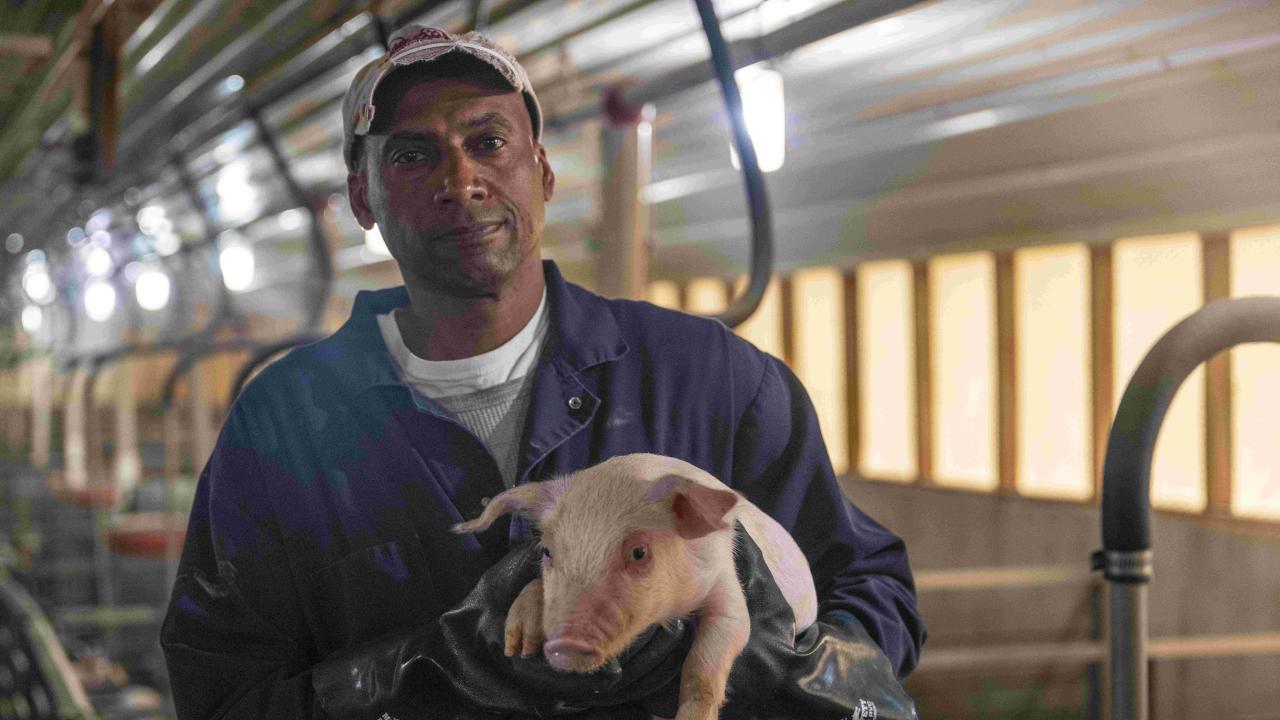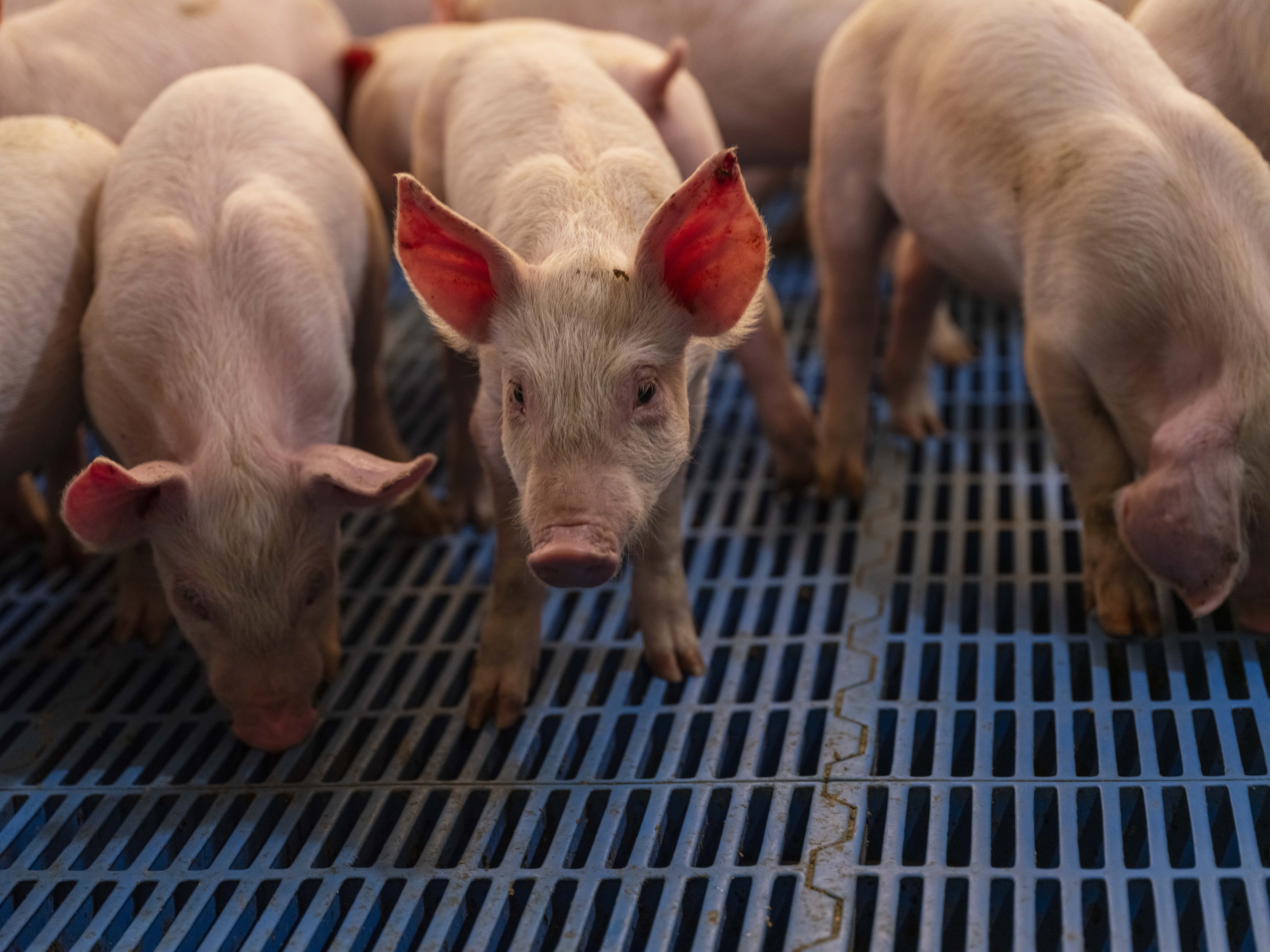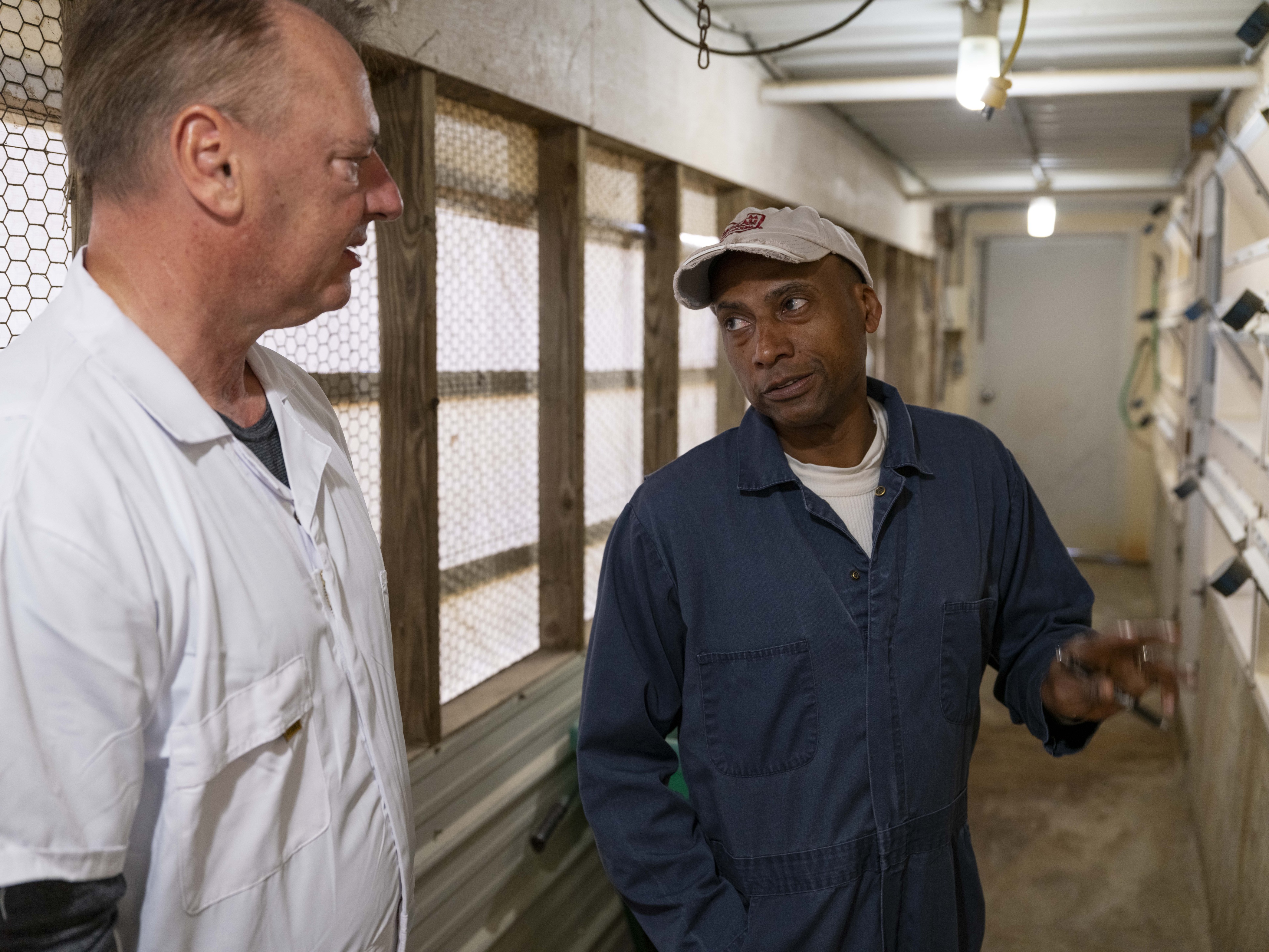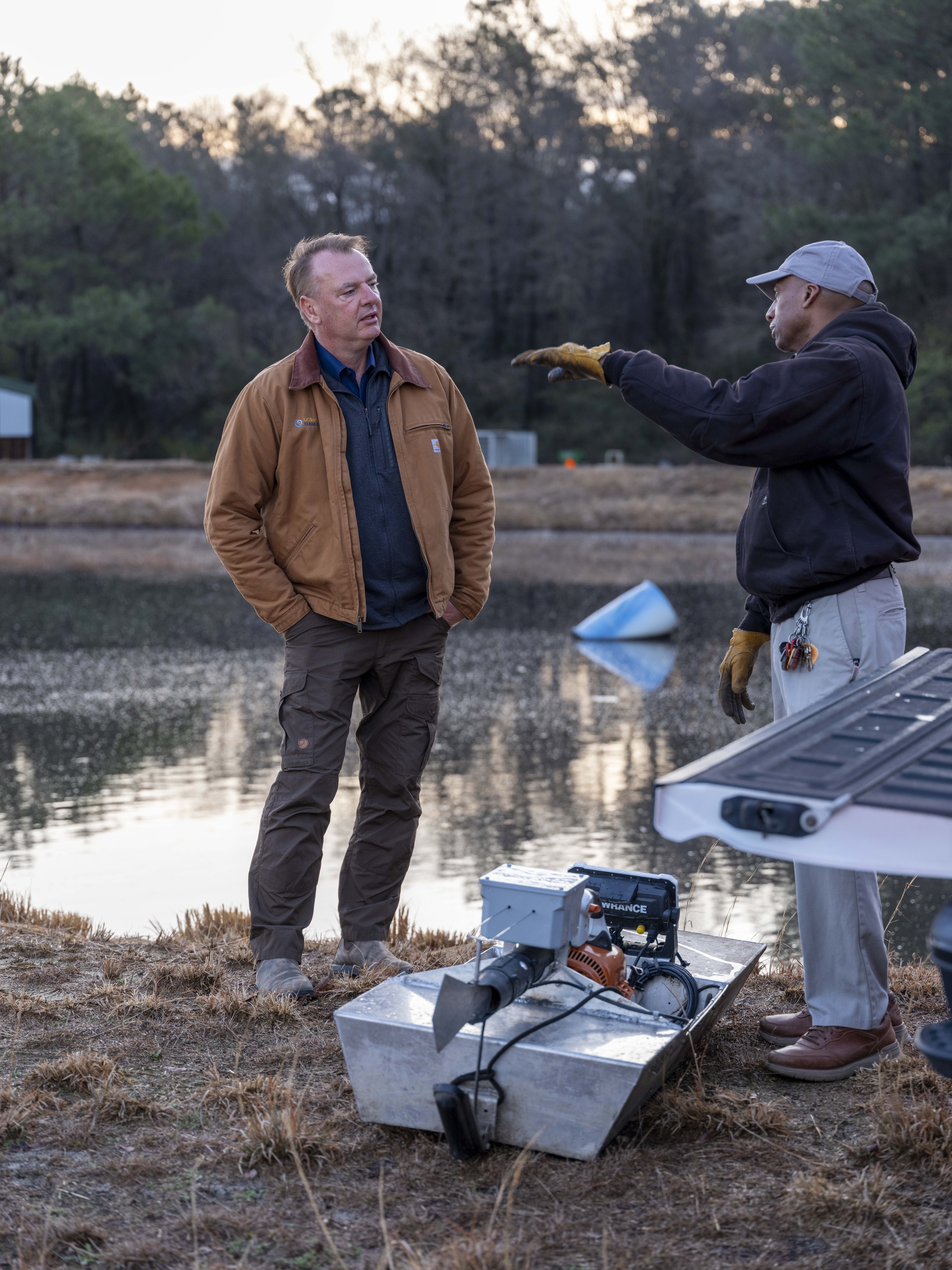
Pig Farmer Makes a Name for Himself by Pioneering Sustainability
In the small town of Clinton, North Carolina, pig farmer James Lamb is the living embodiment of the old TV sitcom Cheers' theme song, "Where Everybody Knows Your Name." With a population of around 8,300, nearly everyone in the town knows James Lamb—in part because his farming family has been embedded in the community for decades, and in part due to his mindset of working to improve the natural resources he’s been entrusted with for future generations in Clinton and beyond.
“I’ve always had this ideology that I like to turn good into great,” Lamb said.
In a small rural farming community, everyone knowing your name means you're more than just a neighbor—you’re part of a close-knit circle. It comes with a deep sense of belonging, and a pride in the land to ensure that it is taken care of for the people living around you, now and in the future.
A Farm Rooted in Tradition
Lamb learned these life lessons early on as he followed his father around their 75-acre family farm in Clinton, yearning to learn all he could about agriculture. There was no doubt in his mind he would follow in his father’s footsteps as he rode around on the tractor with his dad as they worked on their small, but profitable farm, that was started by his grandfather and where they grew cucumbers, okra corn, soybeans and raised pigs along with a small herd of cattle too. All that he learned about the farm from his dad would be put to the test in a grueling way in March of 1990, when his father was killed in automobile accident, and the task of running part of the family farm was put on to the younger Lamb, who was just a teenager at the time.
While still in high school, Lamb balanced his studies with work on his family farm. After graduating, he continued working weekends on the farm while enrolling in North Carolina State University’s School of Agricultural Engineering. He earned his B.S. in Agriculture and Environmental Technology in 1996. And it was during college, that he made a pivotal choice to intern with a North Carolina company called Prestage Farms—a decision that would shape his future career.
Prestage Farms is a multi-generational, family-owned and operated pork and poultry producer and processor. Established in 1983 by Marsha and Bill Prestage, the company is now run by their sons Ron, Scott, and John—who proudly carry on the family tradition of producing the highest quality poultry and pork. Today, a third generation is also actively involved in the business, ensuring that the Prestage legacy of innovation and agricultural excellence continues well into the future. Their corporate office remains in Clinton, North Carolina—a location that’s no accident, but a reflection of their deep roots and commitment to their community.
While Clinton might be small in population, it is big when it comes to pig production. Clinton is in Sampson County, which is the state’s top agriculture county. The county ranks #2 in hog production and plays a critical role in North Carolina’s economy.
John Prestage is the president of Prestage Farms and takes great pride in the company’s commitment to responsible practices within the industry.
“The sustainable thing we can always do is we always need to strive to be better and get more efficient and take less feed and less resources to turn that into meat,” Prestage said. “And that is still in my opinion the most important sustainability goal to have –the efficiency and the execution of that to produce meat affordably.
Once his internship was complete, Lamb went on to accept a job as the environment specialist for Prestage Farms in 2003, which was a natural fit for Lamb.
“As a kid growing up on a farm and in nature, I always had a fondness for nature and the environment,” Lamb said. “That kind of spurred my education and beyond, because I found it easier to learn things I was interested in.”
Protecting the environment is now part of his everyday life, in his role as an environmental and manure-management specialist at Prestage Farms. He helps partner growers with Prestage in the Carolinas comply with state environmental regulations, including practices like recycling pig manure and using it as fertilizer on pastures and cropland. Lamb is also involved in research to find ways for pig farms to further reduce their carbon footprint and recycle nutrients by finding other uses of manure, such as for energy. He also helps Prestage contract growers obtain and keep necessary permits as well.
“James (in his sustainability role) works with people, and he doesn’t tell them what to do and so people like him more and respect him more because of this,” Prestage said.
As an environmental specialist spanning eight counties in North Carolina and one in South Carolina, Lamb has become a familiar name in the field. Along the way, he’s built not just a network of colleagues, but a circle of people who know him by name—and many of them have gone on to become lifelong friends.
One of those he calls a friend, and colleague, is Roy Lee Lindsey, CEO of the North Carolina Pork Council.
“I’ve known James Lamb for more than 20 years, going back to our time together at national pork industry meetings when I was with the Oklahoma Pork Council,” said Lindsey. “From day one, James stood out. He’s devoted countless hours representing North Carolina’s pork industry — locally, statewide, and nationally — through committee work, public events, and policy discussions.”
Lindsey went on to add that, “What sets James apart is his deep appreciation for environmental stewardship and sustainability. He speaks with clarity and credibility about how today’s hog farmers care for their animals, protect natural resources, and help feed families not just in North Carolina, but across the nation and the world. His voice carries weight because it’s rooted in experience — and because he truly believes in what our farmers are doing. James is the kind of leader who earns respect through hard work and humility. He doesn’t just represent agriculture — he embodies its values.”
While people might recognize his name, it's the connections and friendships that Lamb has formed that matter most to him.
“It’s like my dad used to say, before cell phones, when you travel, always try to make a new friend,” Lamb said. “Because you never know when you might need their help or can help them.”
Raising Pigs the Right Way: Animal Care Comes First
Helping others comply with environmental regulations was just part of Lamb’s duties when he started at Prestage Farms. The other part was learning the various stages of pork production, and he quickly realized he was drawn to the nursery operation side of pork production. He went on to become a contract grower for Prestage Farms, eventually building a pig nursery farm on the same parcel of land near where he grew up in Clinton.
He receives weaned pigs at 21 days of age and keeps them for seven weeks or until they’re about 50-60 pounds and then sends them to finishing farms until they reach their market weight.

He and his family manage the nursery operation and grow corn, soybeans, millet, sunflowers, and Bermuda grass. Over the years Lamb has constructed two swine barns to house his animals and added a security system that monitors room temperatures, feed delivery, water pressure and power — all of which can be easily checked via his cell phone, so he’s never far away from being in touch with what’s going on with his animals. While technology can help, the human element is what takes a good farmer to being a great farmer, and for Lamb, that means walking through the pig barns every day to ensure his animals are healthy.
Animal welfare for pigs is a crucial part of sustainability. Healthy pigs that live in a stress-free environment and are well cared for are the cornerstone to success for a farmer. In addition, healthy animals strengthen the entire food system, making it more economically resilient.
“A good grower knows how each of his animals is doing and if you were to ask James, he would know the answer because he knows about each of his animals—he wants to grow the best pigs around,” said Prestage.
Lamb enforces a strict biosecurity program at the nursery on his farm, including air filtration to prevent airborne diseases, mandatory shower procedures for farm personnel, and disposable boots and coveralls for farm visitors. The farm maintains certifications with Pork Quality Assurance, affirming its commitment to implementing best practices. Lamb Family Farms also follows the “We Care” principles, an industry-wide initiative that promotes responsible practices in all areas of farming, whether animal well-being, food safety, environmental stewardship or community commitment.
Dr. Frank Mitloehner, Director of the CLEAR Center, toured Lamb’s farm and saw firsthand the deep respect and care Lamb shows for his animals.

“He's dealing with three-weak-old-piglets. These animals are just weaned off their mum, and that's a period when they are very susceptible still to any kind of stressful conditions or disease,” Mitloehner said. “So you have to be very careful in how you raise those animals. It's much like just think of a birthing station in a hospital, and those little infants that just taken off their mum to be treated in a certain way. They have to be treated with great care, because otherwise they can get sick very quickly or even die. So, if you don't have that down to the fine art, you are not in this business.”
Mitloehner went onto add, “When I see a farmer walking the farm in the morning, I see people who really deeply care for those animals. It’s not a thing; it’s a living being.”
Sustainability Practices in Pig Farming Lead to Innovation
In agriculture, conserving resources like water, soil, and energy are essential parts to sustainability—it's about farming in a way that protects the land, supports long-term productivity, and ensures future generations can continue to grow and thrive. This sort of conservation, with long-term goals in mind is something Lamb can trace back to his parents for instilling in him.
“Well, the things I learned from my family, my parents both grew up, probably in the Great Depression era, so they used to have a garden we had large gardens in addition to the farm for our own consumption. And my mother, every summer, she would preserve fruits and vegetables for the winter months. They were always conservative. They'd always try to find ways to reuse things that we had in the past to use in the future.”
Farmers are the original conservationists—they are tied to the land more than anyone and therefore they staunchly protect and conserve the natural resources they are entrusted with and reusing, recycling and rethinking are part of being a farmer. And for Lamb, and other pig farmers, waste management and ensuring there is minimal environmental impact on the land is crucial for sustaining agriculture, now and in the future.
Manure on Lamb’s farm is handled in a pit recharge system. Waste falls through slits and is drained weekly by gravity flow to an anaerobic lagoon. Solids break down through the anaerobic process, and water is recycled back under the pit for the next cycle.
Each year, he pumps liquid from the lagoon and applies it to Bermuda grass fields. The system is designed to have zero environmental impact: the plants absorb the nutrients, and when the grass is harvested, those nutrients are removed from the land. The goal is balance—applying only what the crops can take up, leaving no excess behind in the soil.
Sustainability usually involves maximizing resources and solving unique challenges with clever and creative solutions. It takes creativity to reimagine what’s possible and challenge the norm.
Lamb has used ingenuity to help develop a tool which he affectionally calls a “sludge boat.” It is a remote-controlled boat that is used to measure the sludge depth in anaerobic lagoons, a measurement that is required by the state. The boat carrying a sonar device similar to a depth-finder for fishing and is propelled by a leaf blower. A transducer sends a sonar signal toward the bottom of the lagoon, and when it hits the top of the sludge it bounces back. Using a lagoon depth measurement initially taken with a pole and the current water level, he can easily calculate the depth of the sludge.

“This is important because anything that’s inorganic, like ash, sand and soil—will sink to the bottom and is called sludge,” Dr. Mitloehner said. “And that sludge builds up and the more it builds up, the less workable space there is for the microbes to actually digest the material in the lagoon.”
“There is a minimum liquid level that must be maintained in the lagoon at all times, and the sludge level should not exceed 50%,” Lamb explained.
The boat helps him to measure and monitor this and in North Carolina, they must do an annual sludge survey where they calculate the percentage of solids versus liquids in an anaerobic lagoon. Lamb is working with his alma mater, North Carolina State to create more of these sludge boats to make sampling waste lagoons easier and safer.
Through his innovative practices that help to reduce waste, conserve water, and improve soil health, he’s setting an example of how modern pig farming can support both productivity and environmental stewardship. Using creativity to solve today’s problems is what Lamb has used as his North Star to protect resources on his farm. This is part of his life mantra of turning “good into great” and it hasn’t gone unnoticed.
Lamb was named “Outstanding Pork Producer” in 2016 by the North Carolina Pork Council and in 2020 he was named “North Carolina Farmer of the Year” by the North Carolina Farm Bureau Federation.
“James Lamb is one of the most dedicated, responsible and visionary pork producers I know, and all of North Carolina’s pork sector has benefitted from his involvement,” said North Carolina Farm Bureau President Shawn Harding. “He has truly been a model of how to care for the environment, care for animals and advocate effectively for the needs and future of North Carolina pork.”
Grounded in Their Land: Family Keeps Pig Farm Going
While Lamb manages the day-to-day workload of the farm today, it has been a family affair to keep the farm going. His mom, Thelma, now in her 90’s, at one time handled all the finances of the farm and was a fixture in the pig barns, diligently recording temperatures and the feed of the piglets in their care, every day.
“When I was younger, I just loved being in the barn with the pigs and looking after them,” she fondly recalled.
And Lamb’s daughters, Maegan and Kensley help on the farm when they can, but have also forged their own future, studying law and pharmaceutic studies. Lamb’s wife, Felicia worked in education for many years before semi-retiring and opening a small clothing boutique named, “Country Threads,” on Main Street in downtown Clinton, where people drop in to shop and of course, ask about James and the farm. Such is life in a rural community, where everybody knows your name.
And today the Lamb name stands as the enduring legacy of a family that is as closely tied to their community as to their land. Both of have been shaped by years of care and devotion by the family.
“It is of extreme importance to a farmer like James, that the land that he has control over, which is in his family for generations, that is his legacy,” Mitloehner said. “And of course, he wants to make sure that this land is passed on to the next generation. And so that is really the legacy of a farmer, and the pride of a farmer to maintain the quality of that land, of that water, of the resources they have. And here is just one of those examples that the world can see and that shows how deeply they care.”
In a small rural farming community, having everyone know your name means you're woven into the fabric of the place—it’s trust built over generations, and the quiet pride of being known and valued for who you are and the work you have done. And that you continue to do, every day.
Indeed, upholding the Lamb name means preserving a rich legacy; forging a path forward that is grounded in tradition and resiliency.
“My dad was always worried about the family farm and so that's what motivates me to keep going and keep doing what I'm doing,” Lamb said. “I think he’d be proud of me.”
Lamb added that “When your job is that thing you look forward to every day, then I think it’s right and it’s the right thing for me.”
The CLEAR Center receives support from the Pork Checkoff, through the National Pork Board.
(Video and photos by Kevin Ulrich/UC Davis)
